Peter MALONE
Saturday, 18 September 2021 19:20
Shaker Run
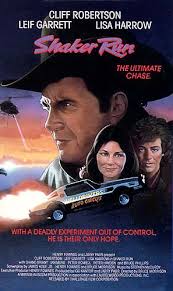
SHAKER RUN
New Zealand, 1985, 91 minutes, Colour.
Cliff Robertson, Leif Garrett, Lisa Harrow, Shane Briant, Ian Mune.
Directed by Bruce Morrison.
Shaker Run is a New Zealand film directed by Bruce Morrison (Constance). However, it relies on two American stars for its impact. Cliff Robertson gives an effortless performance as a burnt-out stunt driver. Rock star and actor Leif Garret gives warm support. Lisa Harrow, the New Zealand international star, is the central figure.
The film's plot is no better (and no more credible) than an average episode in a television series. However, the film has excellent use of South Island New Zealand scenery, a lot of road work and speed driving, a number of stunts with cars and helicopters, especially the finale (and a good percentage of New Zealand's Secret Service crashing over cliffs).
While the material is routine, the stars and the spectacular photography make it an enjoyable average entertainment about speeding cars as well as an idealist scientist who wants to save the world. Unfortunately, she thinks that the C.I.A. are more credible than the New Zealand military forces. The film leaves us with than ambiguous thought at the end. (One of the co-writers was James Kouf Junior, who was to write Stakeout and write and direct Disorganised Crime.)
1. Enjoyable thriller? New Zealand settings?
2. The New Zealand locations, the beauty of the South Island, the open highways? Special effects, speed? Stunts, explosions? Musical score?
3. The title, the reference to the car, Judd and his working of the car, the final run and mission?
4. The focus on Judd and Casey? In New Zealand, the background in the U.S., Judd killing Casey's father at Daytona? Practising, the difficulties with the car? Travelling around, the exhibition and demonstration? Judd and Cliff Robertson's style, easygoing, effortless performance? Relationship With Casey? Christine's approach, the haggling? The decision to take the job, no questions asked? Fixing the car, going on the run, the puzzle about the box? Through the New Zealand highways? The approach of the helicopter, the soldiers, the shooting? Judd and his ability with the car, getting them out of difficulties? The dangerous pursuit? The quality driving? The managing of the car? Judd's being wounded, the siege, Casey having to drive the car out? The final pursuit, being trapped, driving through the bullets? The lowering of the helicopter and their going out over the cliff? The sketch of Judd's character? Casey, his work as a mechanic, devotion to Judd, fear of fast driving, the night on the town, the haggling over the price, finally driving?
5. Christine and her work, the experiments, the death of her co-workers? Thoreau and his visit? The discussion with Michael? The decision to steal the culture? At the speedway, the approach to Judd, the haggling? Her stealing the culture, arrival, no questions asked? The travel, the shooting, her regrets? Interrogating Judd about the past? Tending his wound? The phone calls to Barry, dealings with Michael? The final helicopter and her tying the chain to the car, the rescue? Her mistrust of the New Zealand security and military forces? Her faith in the C.I.A?
6. Barry and the C.I.A., his support, Interested in only getting the culture? Handling the situation? Michael, his support, helping Christine with the culture? Thoreau and the torture and shooting his hand? The finale with Barry? The C.I.A?
7. Thoreau, his silent ruthlessness, in the experimental laboratories, the stealing of the culture, the pursuit in helicopter, car? His henchmen and the shooting, his death? The finale and the vehicles all over the cliff?
8. How credible was the plot? Scientific experimentation? Military and C.I.A? In New Zealand? The stealing of the culture, the run in the car? The gun battle? The final destruction? The material of TV series episodes?
9. Popular entertainment, New Zealand and American style? (And the film's finale and warning for audiences to drive home safely!)
Published in Movie Reviews
Published in
Movie Reviews
Tagged under
Saturday, 18 September 2021 19:20
Second Time Lucky
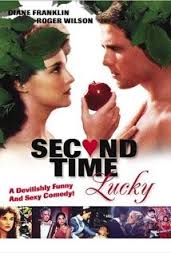
SECOND TIME LUCKY
New Zealand, 1984, 101 minutes, Colour.
Diane Franklin, Roger Wilson, Robert Morley, Robert Helpmann, John Michael Howson.
Directed by Michael Anderson.
Second Time Lucky is an eccentric piece of film-making - with some moderate entertainment, especially for the most undemanding audiences.
The film was produced by Antony I. Ginnane, the Australian producer who incurred the wrath of Australian Actors' Equity by his importing of overseas stars. These stars were considered unnecessary to the success of his films - and, generally, in fact they were. With the production of The Race for the Yankee Zephyr, Ginnane transferred his productions to New Zealand (Dead Kids, Prisoners, Mesmerised). This film was produced in New Zealand.
Ginnane went for popular entertainment of the mid-Pacific or mid-Atlantic kind. His Australian productions included the phantasm films, Blue Fire Lady, Patrick, Snapshot, Thirst, Harlequin, The Survivor. Here, his New Zealand locations are made to simulate Middle America. He also employs Diane Franklin and Roger Wilson, American young stars. The film is designed for the popular American audience.
However, he has also employed a rotund and ruddy-faced Robert Morley for some introductory sequences as God and has employed Sir Robert Helpmann as the Devil - who assumes a number of disguises throughout the ages. Both stars ham up their performances. a prominent New Zealand comedian, performs quite well as the harassed angelic adviser. John Michael Howson, the Australian writer and critic, does camp performances as the Devil's assistant. It was all directed by veteran Michael Anderson (The Dambusters, 1984, The Wreck of the Mary Deare in early days and later spectacles as Operation Crossbow, Logan's Run).
The film trades on the popularity of Heaven and Hell fantasies over the decades - from All That Money Can Buy and Here Comes Mr Jordan in the '40s to the bizarre History of Mankind (which this film sometimes resembles) in the '50s. The '70s brought Warren Beatty's Heaven Can Wait, 1984, the year of this film's release, brought John Travolta and Olivia Newton-John? being confronted by angels (Charles Durning, Scatman Crothers, Beatrice Straight amongst others) and redeeming themselves in Two of a Kind.
The film opens with the Devil making a phone call to the Heavenly Court, Heaven and Hell being the caricature conventions of popular imagination - unfortunately. Back on Earth, the scene is one of these inevitable teenage parties so popular in films of the early '80s (e.g. Porky's). The awkward hero encounters an attractive heroine - they are the chosen ones. The film then has several episodes which have some glimpses of humour, but otherwise are surprisingly flat with very obvious high school humour.
The first sequence involves Adam and Eve with Helpmann as the serpent. This gives an opportunity for some coy nude sequences. The next sequence is set in the Roman Empire - with a kind of an orgy for parental guidance audiences and John Michael Howson making his first camp appearance. The film then makes a transition to the period of the First World War - and is a bit more successful. There are scenes of the war, the trenches and the aftermath of the injured. There is also a long gangster sequence - Helpmann is at his best in this. It is a parody of gangster films. The final sequence is in a British recording studio -with some satire at the expense of pop stars and moguls such as Sir Lew Grade.
While the film is made competently, it seems a rather bad waste of time and money for most concerned.
Published in Movie Reviews
Published in
Movie Reviews
Tagged under
Saturday, 18 September 2021 19:20
Single Life, A

A SINGLE LIFE
Australia, 1986, 90 minutes, Colour.
Tina Bursill, Terry Donovan, Pamela Rabe, Steve Jacobs.
Directed by John Power.
A Single Life is an Australian telemovie that had its airing on the ABC. It was directed by John Power, director of The Picture Show Man. It has a Melbourne setting and uses the city well.
The focus is on a woman who has a desire to have a child. Hers is the single life because she does not want to be involved with the father of the child. She singles him out - and, of course, there are emotional and dramatic consequences.
The film seems to be presenting the plot from the woman's viewpoint - but there seems to be a shift in the latter part of the film for audiences to appreciate the stances of both men and women.
1. Interesting telemovie drama? Australian setting and themes?
2. The use of Melbourne locations? The atmosphere of the city? Authenticity?
3. The title, its reference, viewpoint? point of view?
4. Inviting the audience to take a stance?
5. The portrait of Billie: as a dancer, wanting employment, her friend and the discussions about the possibility of having a child, his withdrawing? The visit to the gynaecologist? Lee and her friendship? Her getting a job, at work, the encounter with Richard? The beginning of the affair? Her choice of Richard for the father of bar child? The conduct of the affair - and his relationship with his wife? Billie's relationship with Maggie? The possibilities? Her becoming pregnant? Her disappearance? New home, having the baby? Establishing herself in her single life? Richard's discovery of her, the clash, his discovery of the truth? His kidnapping the baby and her reaction? The court sequences - and the verdict going against him? His visits, Billie's relenting? Their coming to an understanding? The possibilities for the future?
6. Audience response to Billie as a person, her hopes, way of life, the relationship with Richard, her deliberate choice to become pregnant and not to tell the father, her cutting herself off from Richard, his behaviour, her harshness?
7. Richard: at work, type, his relationship with his wife, the clashes, the effect of the affair, his separation from Maggie, Billie's disappearance, his losing everything, his collapse? His discussions with his lawyer friend? The visit to the creche, the kidnapping of the child? The court case - and the real threat of his going to prison? His desperation? Following Billie? His asking for understanding?
8. The sketch of Maggie, her relationship with her husband, her life, style, the clash, separation?
9. Lee, her friendship? Support of Billie? Questioning her?
10. The lawyer and his advice, help?
11. The portrait of men and women in contemporary society? Relationships? Hopes? Marriage and parenthood? Children? The portrayal of decisions and decision-making?
Published in Movie Reviews
Published in
Movie Reviews
Tagged under
Saturday, 18 September 2021 19:20
Sweet Dreamers

SWEET DREAMERS
Australia, 1982, 96 minutes, Colour.
Richard Moir, Sue Smithers.
Directed by Tom Cowan.
Sweet Dreamers was written and directed by photographer-director Tom Cowan (The Office Picnic, Promised Woman, Journey Among Women). He has received great acclaim and awards for his work as a cameraman in the Australian film renaissance.
However, he did not receive much acclaim (rather the opposite) for this film. It is semi-autobiographical - and reflects Cowan's interest in the difference between Australian attitudes as expressed by expatriates in London and the reality. This was the theme of his early '70s short film Australia-Felix?.
The plot focuses on a film-maker who has ambitions to work in Australia, highlight Australian themes. He encounters an actress in London. They live together and fall in love. They have a friend who has all kinds of theories about film-making. On their return to Australia, they don't find film-making as easy as they thought, the pressures of the industry, financial considerations as well as artistic loom. The material is the familiar discussions about Australian film-making, popular and government support in the '70s and '80s.
However, the film fails in its dialogue - it seems quite unreal and often has been greeted by audiences with laughter. Sue Smithers is not particularly persuasive as the actress who shares the director's life. Richard Moir, a competent actor, does his best with the central role. Ultimately, the film turns in on itself - far from making the high-flown film he imagined, the director settles for making the film which the audience is actually watching. Crew and cast join in at the end of the film.
Published in Movie Reviews
Published in
Movie Reviews
Tagged under
Saturday, 18 September 2021 19:20
Surfer

SURFER
Australia, 1986, 90 minutes, Colour.
Gary Day, Gosia Dobrowolska, Rod Mullinar, Tony Barry, Gerard Maguire, Kris McQuade?.
Directed by Frank Shields.
Surfer has potential as a Queensland private eye thriller. But it develops its potential only partially. Gary Day is effective enough (if not charismatic) as Sam Barlow (combination of Sam Spade and Philip Marlowe?), an ex-Vietnam veteran who runs a beach service at Surfers. The placidity of his life is interrupted when his best friend is killed and there is involvement in blackmail, police and political corruption. He tries to investigate, is framed for murder and has to go to Townsville with the mysterious Gina (Gosia Dobrowalska - Silver City, Around the World in 80 Ways).
Much of the film is spent in stunt work for their pursuit and the interesting ingredients of the first part of the film are lost and barely taken up at the ending. Which means then that Surfer is similar to many television episodes of Australian and American series. The Queensland locations are attractively used, there is good photography by documentary-maker Michael Edols. A strong supporting cast does what it can in limited time with the supporting roles.
The film is based on an idea and directed by Frank Shields who directed the vigorous Hostage.
1. Interesting and entertaining private eye type thriller? Queensland settings? Police and political corruption? The smuggling of Yellow Cake to Asia?
2. Location photography: Surfers Paradise, Brisbane, Queensland forests, Townsville? Special effects and stunt work? The musical score, songs?
3. The title and its focus on Sam Barlow? His age, ex-surfer? Experience in Vietnam? Friends? His job on the beach? The change to his life? The final slow motion sequence of him running - to what?
4. The character of Sam: age, experience, casual, ex-wife, friendship with Jack and Trish, the party, getting him to deliver the letter, the involvement in Jack's problems, his death, the Courier Mail and news services, the investigations, Calhoun and his interrogations? The-air of mystery, the visit to the Vietnamese club? The visit to the casino and the encounter with Hagan? Calhoun taking Gina and himself? The fight and Calhoun's death? The mystery with Slaney and his murder? Sam having to escape, going with Gina, her help? The car-ride, the pursuit and the crashes, the helicopter, the forest? The attraction towards Gina, waterfall sequences, the beach the night together? Hagan's pursuit? The getting of the second hand car? The sequences on the wharf, the discovery of the truth, the confrontation with Hagan, his death? Gina’s choices? Sam's choice?
5. Gina and her mysterious background, European, their need for money? Entanglement with Jack - how responsible for his death? Entanglement with Hagan? Her flight with Jack, the Capture by Calhoun, his death? Dangers experienced? In love with Jack? The final confrontation, her need of the money, her leaving, her stopping?
6. Hagan and his work in Saigon, mercenary, links with the politicians, paying the police? The smuggling of the Yellow Cake, Vietnamese connections? Pursuing the couple, his power, his death?
7. Jack and Trish, past friendships, the, shaky marriage, Trish's dependence on Sam, her dislike of Gina? Jack and his contacts, blackmailing the politician, contacts with the Vietnamese, his death?
8. Slaney being in jail, past friendships, the death of his wife, his murder?
9. Calhoun as the corrupt cop, the parties, being paid off by Hagan, doing his job, covering up. his death? The theme of the corrupt mines Minister, Vietnamese women connection, with Hagan, at the wharf? The political implications of the smuggling of Yellow Cake? This thread not being pursued?
10. Popular ingredients of the private eye thriller? The chase thriller? The film relying on convention rather than originality?
Published in Movie Reviews
Published in
Movie Reviews
Tagged under
Saturday, 18 September 2021 19:20
Soldier Settler, The
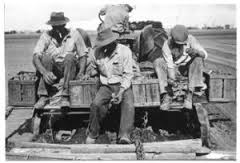
THE SOLDIER SETTLER
Australia, 1988, 50 minutes, Colour.
Jim Holt.
Directed by George Ogilvie.
The Soldier Settler is one of the best of the Willessee's Australians series made for the Bicentenary. Instead of focusing on a well-known individual, it focuses on a returned soldier from World War Two, his wife and children and their struggle to make a go of a farm allotted to them by lottery. The soldier settler becomes representative of the post-World War Two Australia.
The film is well-written by Peter Schreck (We of the Never Never) and directed by George Ogilvie (Mad Max Beyond Thunderdome, Short Changed, The Place at the Coast). It has a strong cast, has a wonderful evocation of the atmosphere of 1950 and portrays vividly the struggles of the young Australian family to survive.
1. A different approach to Willessee's Australians? The symbolic individual and family? In their period?
2. The re-creation of 1950, the post-World War Two atmosphere, the railways, the farms, the small country town, individuals and their coping, the lifestyle?
3. The re-creation of the period, northern New South Wales locations, land, the farms, the town? The atmospheric score?
4. The situation of 1950, the men on the railways, their families, the lottery, the allotment of land, the conditions for loans, the families finding it too difficult, financial losses, walking off the properties?
5. The soldier and his wife, travelling to the farm, the arrival, the house and its ugliness, the bin of bottles, the newspaper-windows? Jack and his decision to cope? The mother and her weeping? The hard life, the land, the broken mill, the constant work?
6. The portrait of the soldier settler: his character, the experience of war, comradeship, willingness for hard work, bringing his family to the farm, his relationship with his wife, tenderness yet anger, the same with Jack? The money difficulties, friends leaving the properties? His having to go shearing, involved in transport work - though illegal? Trying to build, the ploughing of the fields, the buying of the tractor? The aspects of social life - the Dawn Service, at the pub, the dance? The coming of the inspector and having to fix the pump? The long sequences of fixing the pump, his reliance on his son, his hurting his hand? His anger with his son about the dog, hitting him? Apologies? The success with the water? Strength of character, hardships, hope?
7. The wife and her loyalty and love, sadness at the house, care for their children, housework, meals, hopes? The friendships, the touch of social life? Love for Jack, her regrets? The rain and having to save and cover the grain? Taking Jack's side when her husband hit him? Loyal support?
8. Jack as a young boy, his strength, his going to the house, playing with the dog and his father's anger, his father teaching him to drive and the buying of the tractor, his handling it well, his weariness in ploughing the fields, the rain and having to cover the grain, the ordeal of having to drive steadily and hold the truck with the pump, his one mistake and his father's injury, his father taking out his angers on his son, reconciliation?, A boy with strong character?
9. The sketch of friends, hard work, memories of the Railways, the need for money, loans? Life in the town?
10. The importance of the sequence of the Dawn Service, the memory of the World Wars, the loyalty of the people, their memories? The celebration?
11. Insight into a period? Insight into characters? Symbolic Australians?
Published in Movie Reviews
Published in
Movie Reviews
Tagged under
Saturday, 18 September 2021 19:20
Skin Deep
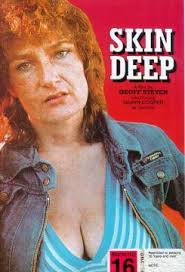
SKIN DEEP
Australia, 1985, 92 minutes, Colour.
Briony Behets, Carmen Duncan, James Smillie, David Reyne, Antoinette Byron, John O'May, Bartholomew John, Kate Fitzpatrick, Maureen O'Shannessy, Jon Finlayson, Jon Ewart, Liz Harris, Gary Day, Betty Lucas, Nicole Kidman, Angelo d'Angelo.
Directed by Chris Langman and Mark Joffe.
Skin Deep is a very glossy telemovie set in the world of fashion and beauty contests. It looks as if it might be Australia's answer to Dallas and Dynasty. It was produced lavishly by Kerry Packer's PBL Productions.
The film has flashbacks to beauty contests and their televising in the '60s and leading into melodramatic situations including rape and the adoption of a child. With the move into the '80s, the film shows the fashion world, modelling and the exploitation of models by unscrupulous business dealers and kinky managers and photographers. There is also the background of television shows.
The film has a very strong cast who do their impersonations with professional aplomb.
1. Barbara: the victim of rape, the winner of the competition, her adopting her child, not having seen her, her success in the fashion world, rivalry with Vanessa, the marriage with Cliff, the discovery of her daughter wanting to be a model, the confrontations, the violence by Roger, the missing of the award.
2. Vanessa and the Australian 'bitch', wealthy, ambitious, running the fashion world, relationship with Grant, liaison with Cliff, the employing of Barbara's daughter, using people.
3. Clifford, the smiling executive, proposal to Barbara, liaison with Vanessa, ambitious and using people.
4. Grant and the up-and-coming model, unscrupulous, using people.
5. Roger and his American background, the rape of Barbara, his reappearance on the scene, his picking up Sheena, the attempted rape, his death, the revelation of the truth?
6. Betty and her concern about her daughter, her going to see the adoptive parents and their concern, the two girls and their eagerness to be models, audition, one girl going on location and finding it boring, the other girl to go to the TV show and awards, the encounter with Roger and the potential danger.
7. Billy and the alcoholic comic, his failures, the devices for drinking, his being looked after by Brad and his tricking him?
8. Sheena as the ingenuous young girl wanting a modelling career, the encounter with Roger, his death?
9. The range of supporting characters, friends, fashion world-people, television world people.
10. A realistic/unrealistic heightened picture of the soap opera world?
Published in Movie Reviews
Published in
Movie Reviews
Tagged under
Saturday, 18 September 2021 19:20
Silent One, The
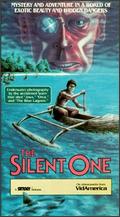
THE SILENT ONE
New Zealand, 1984, 95 minutes, Colour.
George Henare, Pat Evison.
Directed by Yvonne Mackay.
The Silent One is a children's film based on a story by Joy Cowley. Direction is by Yvonne Mackay from a script by Ian Mune (Came a Hot Friday). It was filmed in the Cook Islands and shows the beauty of Polynesian islands and the sea. There is also an excellently-filmed hurricane.
Telo Malase is attractive as the mysterious deaf mute child. Pat Everson is his adoptive mother.
The film is entertaining, works on the level of action adventure as well as legend.
1. A family film? For children? Adventure? Legend? Meanings?
2. New Zealand production, the use of the Cook Island locations? The islands, the sea, village life? The hurricane? Musical score?
3. The legend of The Silent One: the baby coming from the sea, the turtle, the barren mother taking the adoptive child? Growing up on the island? In the village, his not hearing (and the techniques used with the soundtrack for indicating this)? Difficulties of life, his way of hearing, sounds and music? The other children, playing, fishing? The detail of life day by day? The hostility of the priest? His diving, going further out, the white turtle, communication? His dreams? The hostility of the priest, the village? The hurricane? People's reaction, Jonasea on the rocks, surviving? Leaving with the turtle? The turtle imagery for Jonasea ?
4. The mother and her not having any children, saving the baby, loving it, helping him grow up, care? Her being persecuted? Defying the priest? Jonasea and the turtles, disappearances, the hurricane? Her grief as Jonasea went back to the sea?
5. The priest and his power, hostility, defiance, rituals? The people under him? Confrontation? His being outwitted? His death?
6. The presentation of life an the islands, work, play, adults, children, religion? The influence of the priest?
7. The hurricane and its effects, the destruction of the village? Fear, superstition? Rebuilding?
8. Jonasea and the sea, the fish, the shark, turtle?
9. A pleasing blend of action and adventure? Legend for children?
Published in Movie Reviews
Published in
Movie Reviews
Tagged under
Saturday, 18 September 2021 19:20
Swingers
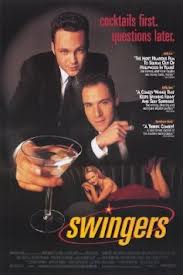
SWINGERS
US, 1996, 92 minutes, Colour.
Jon Favreau, Vince Vaughn, Ron Livingstone, Patrick van Horn, Heather Graham.
Directed by Doug Liman.
Swingers was written by its leading star, Jon Favreau, based on his own experiences of coming to Hollywood, hanging out with male friends, trying to find women companions, going to the bars, wanting to be an actor. Favreau has written a witty and successful screenplay as well as establishing himself not only as an actor (Armageddon, Love and Sex, Daredevil) but also as a director, Made and the very successful Elf (in which he played a cameo role as a doctor). The film also stars Vince Vaughn at the beginning of his career. He then moved on to Jurassic Park II: Lost World as well as Gus van Sant's remake of Psycho. There is a sympathetic cameo towards the end by Heather Graham. The director, Doug Liman, went on to make the portmanteau story film, Go, about the drug scene in Los Angeles and Las Vegas and then the highly successful version of Robert Ludlum's The Bourne Identity with Matt Damon.
The film is strong in its portrait of male bonding, even though the males themselves are full of self-pity about their own inability to get a job, hold a job or are worrying about past relationships or looking for relationships. A lot of their action is childish, playing video games, hanging around together, observing people rather than trying to engage in real interactions. Vince Vaughn has most of the good lines in terms of the brash thirty-year-old who is trying to make an impression and fails. His final scene where he misinterprets a woman playing with her baby sums up the action of this kind of would-be actor. Others are much more intense, morose and self-pitying, like the Favreau character who has some kind of inner depth, especially in the scene he has dancing with Heather Graham. It is a marvellous dancing scene where the audience understands the change in his behaviour, his attitude towards Lorraine, her interest in him.
1. The audience for this film? Thirty-year-old males, females? Older audiences, younger audiences?
2. The Los Angeles settings, the apartments, the nightclubs? The visit to Las Vegas? Authentic atmosphere for this group of would-be friends and would-be actors? The musical score, the songs - especially the opening song of Dean Martin and "Someone To Love Me"?
3. The title, the swingers as middle class rather than upper class? Their moral stances, comparatively conventional, their just wanting jobs, genuine relationships, a place in New York and its society?
4. The screenplay, based on Jon Favreau's experience, authentic, funny, insightful? The different scenes of interaction of Mike with Trent, with Rob, with Sue? With the women, his hankering after Michelle to ring him? The phone calls to Nicky and the awkwardness of the many phone calls? His meeting with Lorraine and the talk at the bar, the dance, the aftermath and her phone call?
5. The character of Mike, age and experience, disappointment with Michelle? Wanting her to ring? Self-pity? Awkwardness, inability to relate? The meeting with Trent, going to Las Vegas, losing the money, their trying to pretend that they knew about gambling when they didn't? The two workers, the discussions, the woman dressed as Dorothy? The return to Los Angeles, his going out with Trent to the club, meeting Nicky, the phone calls and his awkwardness? His staying in, Rob coming to discuss things with him? Going out, the men, the video games? At the bar, the women, their observing people, their comments? The hoods and Sue drawing the gun, the mutual insults and truth-telling between Sue and Mike? The later apology, the stronger friendship? Mike, his seeing Lorraine, going to the bar, the awkward conversation, her taking the lead, the dance, his transformation? Michelle's phone call, putting her on hold, wanting to speak with Lorraine? The finale and his still listening to Trent?
6. Trent, all talk, dapper, a leader, schoolboyish in approach? Going to Las Vegas, pressurising Mike? Talking incessantly? The gambling, the girls? The playing of video games? Male bonding, friendship with Sue, Charles? The outings, the drinking, the observation? His not being able to really help Mike? The final scene and his being taken in by the woman playing with her baby?
7. Lorraine, from Wisconsin, entertainment law, her attraction towards Mike, the conversation, her taking the initiative, inviting him to dance? Saying goodbye, the exchange of cards? Her phone call, a future with Mike?
8. Rob, moving from the east, the auditions for jobs, wanting even to be Goofy at the theme park? Sue and his name, friendship, outings, discussions, pulling the gun, the anger with Mike, the apology?
9. The other men, the male bonding, their being much more at home with each other than with the women?
10. An insight into young Americans of the 90s?
Published in Movie Reviews
Published in
Movie Reviews
Tagged under
Saturday, 18 September 2021 19:20
Singing Detective, The
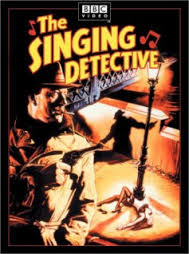
THE SINGING DETECTIVE
US, 2003, 109 minutes, Colour.
Robert Downey Jnr, Robyn Wright- Penn, Jeremy Northam, Mel Gibson, Katie Holmes, Carla Gugino, Adrienne Brodie, Jon Polito, Saul Rubinek, Amy Aquino, David Dorfmann, Alfre Woodard.
Directed by Keith Gordon.
In the years before he died, British playwright and television drama's writer par excellence, Denis Potter adapted his British television series, The Singing Detective (with Michael Gambon) for the cinema screen and with an American setting. For fans of the series, this might well seem a very abridged version. For those who have not seen the series, the film will put audiences on the back foot at first. They will have to do some assessing of their emotional and intellectual response as they come to terms with this internal drama, with the fantasies in the imagination of the detective.
He is in hospital suffering from a virulent form of psoriosis which disfigures his face and makes his whole body alien and uncomfortable. He has written a noir detective story and finds himself retreating into his novel, into his intuitive imagination which has become suspicious of his wife and an agent, assuming that they are out to steal his manuscript. He also lapses back into destructive memories of childhood, his mother's betrayal of his father with his partner at a desert garage. The particularly Potter characteristic (which was to the fore in Potter's television series with Bob Hoskins and the Americanised film version with Steve Martin, Pennies from Heaven) is character's bursting into song and sometimes dance, a selection of songs from the 1960s. While this paragraph describes something of what is going on and how, it still does not prepare us for the experience of moving in and out of times, in and out of truth and fantasy, accepting the songs and trying to understand the character of the detective. It is further complicated when the detective begins therapy with his psychiatrist and wants to play his emotional and defensive games with the doctor.
The strength of the film is in Robert Downey Jr's screen presence and skilful performance, sometimes petulant, sometimes paranoid, sometimes pleasant. His psychiatrist is at first unrecognisable, a balding Mel Gibson. Robin Wright has a very difficult role because she has to embody the detective's wife, both devoted and two-timing in his mind. Jeremy Northam plays the suave agent as well as the seducer of the detective's mother. Then there are two imaginary thugs who keep wandering in and out of the action, murdering Wright at one stage, threatening the detective at another. They are played as an odd couple by Adrien Brody and Jon Polito.
For many the whole thing may be too confusing and demanding, but Keith Gordon's film is an intriguing challenge.
1. The work of Dennis Potter? The original television series and its acclaim? World War II London setting? Potter himself effecting the transition to film and transferring the action to LA in the 1950s? The change of songs from the 40s to those of the 50s?
2. The modern period, the modern hospital? The transition to the darkness of the 1950s in LA, the film noir tradition, Philip Marlowe and the detectives, the irony of the detective being called Dan Dark? The contrast with the open spaces and the country town?
3. The use of the hospital, the bar, homes, the desert, the garage, the open fields? Stylised locations?
4. The range of songs, the 50s, the lyrics illuminating the characters, giving a tone, contributing to the plot?
5. The title, the original novel, the detective Dan Dark? The alter-ego of the central character? The conflict between one half of his ego and the other? The confrontation, the healing of memories, the final shooting and the cure?
6. The themes of health and illness, mind and body, psychosomatic effects? The introduction, the explanation of the illness, the skin disease and its appearance? The establishing of the character with the disease, the interweaving of his past? Robert Downey Jnr appearing as diseased, appearing as healthy? The role of the fantasy, the songs, Don Dark and his actually singing in the nightclub? The role of the gangsters? Jeremy Northam as Bilney and his multiple appearances? Robyn Wright-Penn? as both Nicola and as his wife? As the call-girl Nina? Carla Gugino appearing as his mother? The nature of memories, true and false? A voyeur on one's own life and memories?
7. The establishing of Dark's character: seeing him as a little boy, the strong relationship with his father, seeing his father fix the cars, waving goodbye? His love for his mother, her sexual relationship with Bilney? Bilney being a partner? Her admitting her mistake, taking the boy to Los Angeles in the bus? His mother, suicide, the effect on him, psychologically, emotionally? His attitudes towards women? Sexuality? Betrayal?
8. The introduction to Nicole, in the club, the bath, her murder? Bilney and his authorising it? The parallel with Dark's mother drowning? The screenplay based on the Singing Detective novel? The gangsters, Bilney as suave and as a boss? Supervising the murder? His reaction afterwards? The real visits of the characters and their participation in the screenplay in the modern era? His outbursts, love?
9. The failed writer, putting himself down, his love of words, the screenplay and its inventive use of words? The doctor and his quotes from the book? The inventiveness, the word games, fencing with the doctor? Quotes and punctuation?
10. The visible aspects of the illness, like pizza? His pain, paralysis? The hospital staff and their treatment, carrying him to the bed, the doctors and their visit - and the burst into song? The nurse, her care for him, the sexual overtones of her comments? Her later coming and helping him? The physical healing, the psychological healing? The physical therapy? Nicole and her visits and his response to them?
11. Dr Gibbon, Mel Gibson in disguise, the nature of his performance, comic and serious? A dwarf character? His continued movement, challenge to Dark, his questions, quoting from the book, staring him out, wary, participation in the word games and their significance? His contribution to Dark's health? Challenging him about his boyhood, his parents, women, sexuality?
12. Dark getting better, talking, responding to the challenge - yet elements of madness? His standing, walking? How much in his imagination?
13. The sketch of the gangsters, their appearance, manner, behaviour? Way of talking? The murders? Stranded out in the fields? Their coming to the hospital, the attack? Their wanting to know what they were doing in the plot?
14. Jeremy Northam and his range of appearances, as the man ordering the murder of Nina? As Bilney working in the garage and his relationship with Dark's father and with his mother? His appearing as the executive, wanting the rights to the novel, the discussions with Nicole, sinister or not? All as imagined by Dark?
15. The character of the nurse, her presence in the hospital, her treatment of him, the sexual innuendo?
16. The portrait of Nina and Nicole, how similar, how different, Nina and her murder? His murdering his mother? Nicole, seeming ordinary, her visits, the exasperation, the clashes? The scenes with her discussing the manuscript, the rights? With Bilney? Were they plotting or not? Her visits to Dark, the discussion of the manuscript and his denials? The final healing?
17. The build-up to the finale, the shooting, Dark killing off his other self? The ending with the lights, Dark singing the song?
18. The film as a cinematic experience, its visual impact, aural impact in both song and words, physical impact, psychological impact?
Published in Movie Reviews
Published in
Movie Reviews
Tagged under